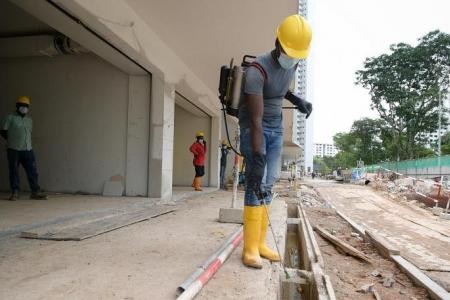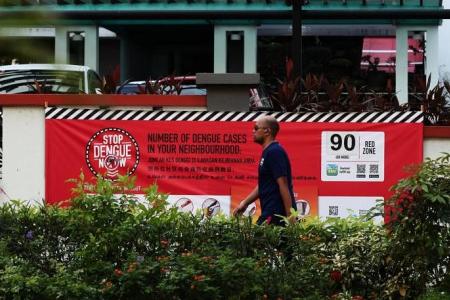Singapore's weekly dengue count expected to hit new peak, may surpass 2,000 cases
The authorities have issued 59 stop-work orders to construction sites for repeated mosquito breeding offences this year, as Singapore braces itself for a record high in weekly dengue cases.
Nine contractors will also be charged in court.
This was after the National Environment Agency (NEA) conducted about 305,000 inspections islandwide. These included about 2,300 checks at construction sites, uncovering about 9,000 mosquito breeding habitats, NEA said on Friday (June 3).
The number of weekly dengue cases here is expected to hit a new peak, surpassing the highest weekly figure of 1,787 cases in 2020, NEA said in its statement.
Last week, 985 cases were reported.
The weekly figure may exceed 2,000 this month, with June being the start of the traditional peak dengue season, added NEA.
More than 12,000 cases of dengue have been reported in 2022. We are still in the first half of the year, and this is already more than twice the 5,258 cases logged in the whole of 2021.
Companies that have been issued stop-work orders (SWOs) are allowed to carry out only corrective actions.
They must also review the effectiveness of sanitation and vector control programmes within the site.
The order will be lifted only when the measures have been completed up to NEA's approval.
On its website, NEA said that construction sites are of particular concern as they can become centres of dengue transmission.
Dengue is transmitted to humans from the bite of an infective mosquito.
In addition to the 59 worksites issued SWOs, six contractors have been issued repeated SWOs at the same worksite due to poor upkeep of the sites.
Among the "egregious cases" of premises with multiple mosquito breeding habitats cited by NEA was a construction site in a dengue cluster in Woodlands Avenue 9.
Nine mosquito breeding sites with more than a few hundred mosquito larvae were detected in sanitary facilities, such as toilet bowls, during an inspection in April.
Another site in Jalan Batai in Upper Thomson Road was found with larvae in places such as ground puddles and a pail.
As at Thursday, there were more than 405 active dengue clusters reported, an increase from the 196 clusters at end-April.
NEA urged the public and owners of premises to take action to break disease transmission, by removing stagnant water and potential breeding sites.
Members of the public are also encouraged to download the myENV app, which can alert users when there is a dengue cluster near their homes.
NEA conducted about 631,000 inspections for mosquito breeding last year.
Forty-three stop-work orders were issued to construction sites, and 54 contractors were charged in court for repeat offences.
Get The New Paper on your phone with the free TNP app. Download from the Apple App Store or Google Play Store now


